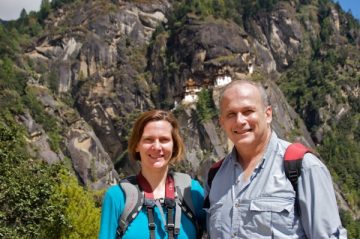
Tom Schlegel and Lisa Elser
For more than five years after Tom Schlegel was diagnosed with myeloma, standard treatments kept his blood cancer in remission. When these medications stopped working, he searched near and far for experimental options in hopes they would lengthen his life.
No clinical trials were available locally. With the help of his doctor, Schlegel looked into a clinical trial based in Seattle. Instead, he and his wife Lisa Elser paid out-of-pocket for medications that were being tested elsewhere to treat myeloma. This kept him going for more than a year.
The next time his condition destabilized, Schlegel was much weaker than before. He didn’t want to travel for care and risk dying away from home, or leave a large medical bill behind for his wife to pay.

“What upset us was with all of the novel treatments for myeloma, we couldn’t access a clinical trial anywhere in B.C.,” says Elser. “We were fortunate to have the means to pay for medications to follow clinical trial protocols. Most B.C. residents could not. Most would have been stuck with no good options long before we were. That isn’t who we are as Canadians, and the lack of clinical trials here in B.C. creates a divide that isn’t right.”
Gaps in core research infrastructure significantly limit access to trials of experimental treatments for patients in B.C.
To produce new cell- and gene-based therapies for testing in clinical trials, research teams need access to a Good Manufacturing Practice (GMP) facility. These have strictly controlled environments and processes to ensure products are high-quality and safe for clinical use. Several top medical research institutes in Canada have GMP facilities, but UBC does not yet have a GMP facility capable of producing cell therapies for testing in early stage clinical trials.
UBC is home to several of the world’s leading researchers of advanced cell-based therapies, which hold great promise to revolutionize the treatment of cancer and autoimmune diseases such as diabetes and multiple sclerosis.
“After proof-of-concept in a research lab, we need a GMP facility to manufacture cells that can be used to treat patients,” says Dr. Megan Levings, Canada Research Chair in Engineered Immune Tolerance and professor in the department of surgery and School of Biomedical Engineering at UBC.
This gap in essential infrastructure, and the lack of highly qualified personnel to operate it, has closed doors for Dr. Levings as she worked to move her innovations forward.
“The farther we can take therapies forward to commercialization here in British Columbia, the higher the likelihood the technology will stay here in the long run, the more we benefit B.C. patients and the more economic value we bring to our province,” she says. “Enabling UBC researchers access to a GMP facility would have broad impact on human heath, economic development and skilled workforce training.”
For more information about supporting core research infrastructure for the UBC Faculty of Medicine, please contact Erin Bartlett at erin.bartlett@ubc.ca.